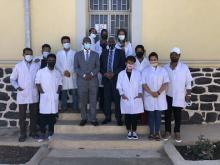Technical Support to upgrade the Microbiology (Bacteriology) Unit of the National Health Laboratory of Eritrea
The Ministry of Health Eritrea requested the technical support of WHO to assess the capacities needed to upgrade the microbiology laboratory which is part of the National Health Laboratory (NHL) and to develop the roadmap for the upgrading of the laboratory. In order to undertake this support WHO engaged a consultant for a period of 3 weeks (22 November to 10 December 2021). The consultant was supported by the WHO laboratory expert from WHO/AFRO who was in country from 7-18 December 2021 as well as WHO Country Office staff. Strong laboratory capacities are essential for detecting and responding to emerging and re-emerging global health threats. As such Microbiological investigations are important in the diagnosis, treatment, and surveillance of infectious diseases and policies regarding the selection and use of antimicrobial drugs. It is, therefore, essential that test reports are relevant, reliable, timely, and interpreted correctly.
The National Health Laboratory (NHL) of Eritrea hosts the unique microbiology (bacteriology) site for culture and antimicrobial susceptibility testing for the whole country, which receives an average of 1300-1500 samples (mostly urine (44%) and blood culture (28.5%)) every year. The objectives of this technical support were to (1) conduct a situation analysis for the current activities at the microbiology laboratory, (2) define minimal requirements for the microbiology national reference laboratory (NRL) to support the surveillance of antimicrobial resistance, and (3) develop a road map for the upgrading of the microbiology laboratories at national and zonal level.
The assessment was done through a combination of methodologies, including key informant interviews, laboratory inspection/observations, and review of existing documents. Data were collected using the WHO Laboratory Assessment Tool with a focus on the 11 modules of: (1) Organization and management; (2) Documents; (3) Specimen collection, handling and transport; (4) Data & information management; (5) Consumables and reagents procurement; (6) Equipment; (7) Laboratory testing, performance; (8) Facilities; (9) Human resources; (10) bio-risk management; and (11) Public health functions). Individual module scores were obtained with the data collected.
Although the NHL microbiology unit is doing well in many of the key functions the situational analysis of the current activities revealed gaps in 5 modules of organisation and managements, documents, consumables and reagents, biosafety and public health. The lowest score was registered for the documents function. It was evident that although the scores of some modules were good, there is still a need for improvement on many aspects. The main gaps identified were incomplete sample analysis and bacterial identification, inadequate antimicrobial susceptibility testing, absence of continuous education for staff, inappropriate infrastructures, lack of international standards, and partial knowledge on quality assurance management.
In summary, the main recommendations for the scale-up of the microbiology laboratory at the national and zonal levels included ensuring (1) urgent training of staff on sample analysis, antimicrobial susceptibility testing, biosafety and quality assurance, (2) improving of bacterial identification through introduction of bacteria identification kits (such as API kits), (3) purchasing international standards, and (4) renovating the NHL microbiology laboratory to meet the biosafety standards. Automation of some sample analysis and introduction of molecular testing methods for the reference laboratory were also be considered. It is worth mentioning that most of these recommendations could be implemented with dedicated government budget allocation and help from technical and financial partners. The technical support was concluded on 10th December 2021 with a successful debriefing session with the laboratory team at the NHL director’s office, followed by a presentation of the main results to the senior management and the Honourable Minister of Health.
Information Assistant
WHO Country Office Eritrea
Work Phone: +291 1 114171/114175
Ext: 34419
Email: berhanes [at] who.int (berhanes[at]who[dot]int)
Email: mgambe [at] who.int (mgambe[at]who[dot]int)
Work Phone: +2911114171
Cell Phone: +2917755647
GPN: 34411



